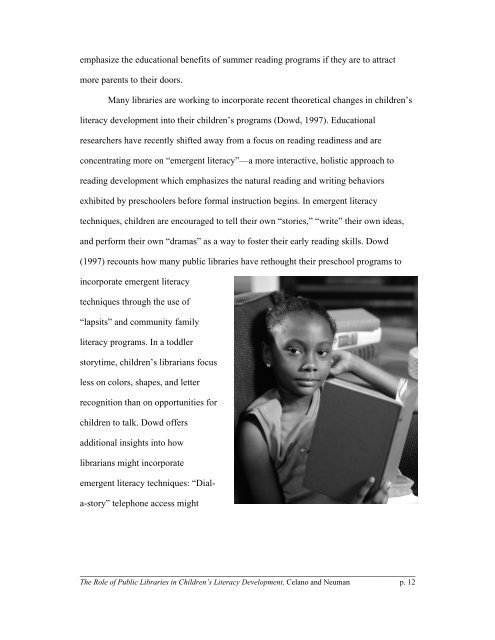Role of Libraries
Role of Libraries
Role of Libraries
Create successful ePaper yourself
Turn your PDF publications into a flip-book with our unique Google optimized e-Paper software.
emphasize the educational benefits <strong>of</strong> summer reading programs if they are to attract<br />
more parents to their doors.<br />
Many libraries are working to incorporate recent theoretical changes in children’s<br />
literacy development into their children’s programs (Dowd, 1997). Educational<br />
researchers have recently shifted away from a focus on reading readiness and are<br />
concentrating more on “emergent literacy”—a more interactive, holistic approach to<br />
reading development which emphasizes the natural reading and writing behaviors<br />
exhibited by preschoolers before formal instruction begins. In emergent literacy<br />
techniques, children are encouraged to tell their own “stories,” “write” their own ideas,<br />
and perform their own “dramas” as a way to foster their early reading skills. Dowd<br />
(1997) recounts how many public libraries have rethought their preschool programs to<br />
incorporate emergent literacy<br />
techniques through the use <strong>of</strong><br />
“lapsits” and community family<br />
literacy programs. In a toddler<br />
storytime, children’s librarians focus<br />
less on colors, shapes, and letter<br />
recognition than on opportunities for<br />
children to talk. Dowd <strong>of</strong>fers<br />
additional insights into how<br />
librarians might incorporate<br />
emergent literacy techniques: “Diala-story”<br />
telephone access might<br />
________________________________________________________________________<br />
The <strong>Role</strong> <strong>of</strong> Public <strong>Libraries</strong> in Children’s Literacy Development, Celano and Neuman p. 12


